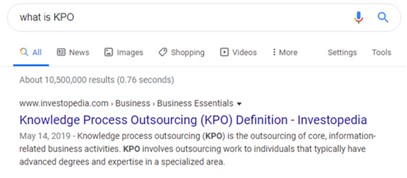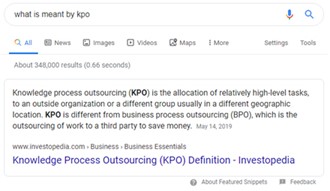Google words or stop words are extremely common words like “a, the, of, or, many etc” that the search engine skips while crawling/indexing. These common words are generally ignored or excluded from search queries to enhance search efficiency and focus on more relevant results. Understanding Google stop words is important for optimizing content and improving search engine visibility. An experienced search engine optimization company will be aware of the right usage of these words to provide attractive content.
Stop words are usually ignored by Google and other search engines, in both search queries and results. Earlier in 2008, Google had stopped displaying stop words. In the past, Google searches involving stop words came with a notice below the search that says:
Your search contains a very common word and was not included in your search
Later, this notice was removed.
It is best to avoid the use of stop words in your content in the following areas:
- Page title tags
- URL
- Meta descriptions
- Image Alt text
Common Stop Words
Link assistant provides a list of stop words ignored by search engines, which include but are not limited to –
| about | come | eighty | indeed |
| above | comes | either | indicate |
| abroad | concerning | else | indicated |
| according | consequently | elsewhere | indicates |
| accordingly | consider | end | inner |
| across | considering | far | inside |
| among | contain | farther | just |
| amongst | containing | few | kept |
| an | contains | fewer | know |
| and | corresponding | fifth | known |
| another | could | first | knows |
| any | do | five | less |
| be | does | gives | lest |
| became | doesn’ t | go | let |
| because | doing | goes | let’ s |
| become | done | going | like |
| becomes | don’ t | gone | liked |
| becoming | down | got | more |
| been | downwards | gotten | moreover |
| before | during | has | most |
| beforehand | each | hasn’ t | mostly |
| between | edu | have | new |
| beyond | eg | haven’ t | nine |
| both | eight | he | ninety |
Why Search Engines Ignore Stop Words
By skipping stop words, search engines can save space in their database and speed up the crawling and indexing process. They often cause many problems to search engines like ambiguity, server load problems, etc. It also helps search engines deliver instant results.
However, whether these words affect the retrieval of the results is the concern. If there is no change in the results, there is no sense in filtering out stop words from search queries and results.
For instance, if you search “What is KPO?” or “What is meant by KPO?” both have the same search intent and Google displays the same result.
Are Stop Words Harmful to SEO?
Earlier, many SEO experts and Yoast plugin recommended websites to remove stop words from their blog post URL, post title, and focus keyword, saying that these words would reduce the ranking of blog posts in SERPs.
But now opinion varies. According to Search Engine News (SEN), it’ s good to use stop words when writing page titles whenever it makes sense to do so. This is mainly true if your keyword research shows that more people are searching for them along with a location, just as Surgery in New York rather than just Surgery New York.
Another opinion is that with the rise of conversational search queries, voice searches, Google is not really worried about using stop words in the URLs or titles.
We are confused as to use or ignore stop words in content, right?
BloggingX offers a solution to check whether to use stop words or not. Search for the main keyword of your blog post, first with stop words and then without them. If Google is considering the stop words, results will be different in both. Then it is better to retain stop words in your title.
In some cases, stop words may hurt whereas in others, these words are necessary for meaningful sentences.
Only Solution – The Right Use
Excessive use hurts SEO. Appropriate use of stop words can only improve user engagement. Filter out all unnecessary stop words from your blog post titles and URLs and try to make use of general words and keywords instead of them.
The best practices you can consider are to –
- Use only limited stop words and not use them unnecessarily
- Keep the blog post URL short, and self-explanatory
- Do not filter out all stop words in the URLs and post titles, it seems unnatural
Google and other search engines seem to be realizing that discouraging usage of stop words spoils the user experience. They recognize most of the stop words as useful words. Content writing services provided by a business’ digital marketing team must be based on such finest and latest content and SEO standards.
By understanding Google stop words and their impact, you can optimize your content effectively and align with search engine practices to improve visibility and enhance the user experience.
Need captivating content that converts?
Contact us Today at (800) 941-5527 for high-quality content writing services!






